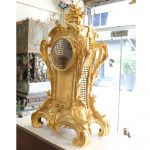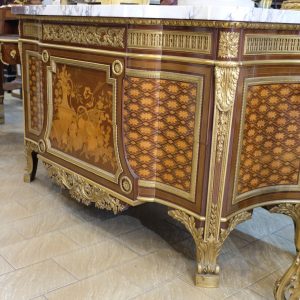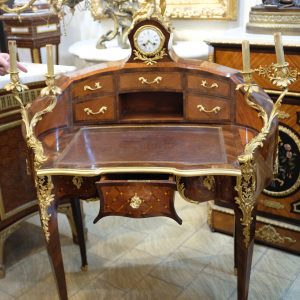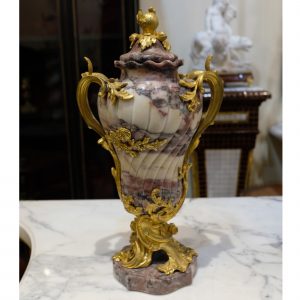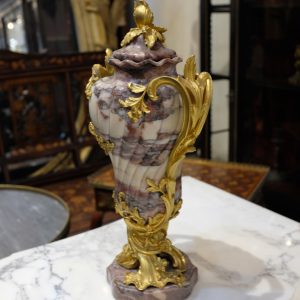Chimney watch by Raingo
25,000 €
Material: Bronze
Technics: Sculpture
Size: 85 x 47 x 30 cm
Year: 1870
Genre: Still life
Style: Napoléon III style
Location: France
Expert comment
This elegant chimney watch, crafted by Raingo, is a testament to exquisite timekeeping and fine craftsmanship. Adorning your hearth with sophistication, it adds a touch of timeless charm to any room. The Raingo brothers quickly gained recognition for their bronze works. Initially known as clockmakers, they expanded their catalog to include art and furniture bronzes. From 1860 onwards, Maison Raingo created remarkable pieces for the Emperor and Empress Eugénie, a collection now housed in the Louvre.
The Raingo family’s legacy in horology traces back to Zacharie Joseph Raingo, born in Mons, Belgium, on July 2, 1775, to Nicolas-Joseph, a clockmaker, and Marie-Magdelaine Decroly. Zacharie honed his craft in Tournai from 1795 to 1807 before establishing his practice in Ghent in 1810. By 1813, he had settled in Paris on rue de Cléry. During this period, inspired by Antide Janvier, Zacharie specialized in crafting his first planetary clocks, a skill for which he became renowned. These astronomical clocks, equipped with rotating spheres, illustrated the proportions, positions, and trajectories of celestial bodies. Zacharie patented a ‘moving sphere clock’ in 1810, publishing a treatise on it in 1823.
In 1823, Zacharie Raingo was appointed Horloger-Mécanicien to S.A.A. Monseigneur le duc de Chartres (future King Louis-Philippe), and the following year, he became Horloger-Mécanicien of the Garde-Meuble de la Couronne. King George IV of England acquired one of Zacharie’s planetary clocks in 1824 for 300 guineas, now housed at Windsor Castle.
The Raingo Frères firm, comprising four of Zacharie’s sons, was established in 1823 and relocated to 8 rue de Touraine around 1830. The brothers included Adolphe Hubert Joseph (1796-1839), Charles François Victor (1801-1884), Denis Lucien Alphonse (1802-1870), and Dorsant Emile Joseph (1805-1859).
Frequently asked
question (FAQ)
You can make a payment directly on the website using a credit card through the checkout option. Alternatively, you can choose the "Quick Order" button and a manager will contact you to discuss all aspects of the artwork, payment, and delivery. We also offer the option to pay after a live viewing.
For certain countries and artists, especially for more affordable works, we have special payment conditions. Simply click on the "Quick Order" button next to the selected artwork, and a manager will get in touch with you to discuss payment after receipt. We prioritize customer satisfaction and strive to help you find your perfect piece of art with a high level of service.
The client covers the cost of shipping. We deliver artworks using various transportation companies based on the country of origin of the artwork and the destination. The delivery cost is calculated in advance in the cart and can be confirmed after considering the artwork's specifications and the regions involved. We pay special attention to the packaging of artworks, particularly for pieces larger than 80 cm, where we use sturdy wooden crates along with cardboard and bubble wrap.
If you reside in the same city where the chosen artwork is located, we can arrange for a viewing. You can select the country where the artwork is located using filters and inquire about the city by pressing the "Quick Order" button. Additionally, upon request, we can provide a detailed video of the artwork showcasing both the front and back. For most artworks, high-quality photos are available on the artwork's description page, allowing you to observe even the smallest details. In some cases, there is an option for payment only after receiving and viewing the artwork in person.
Certainly! We have a methodology for selecting artworks for interior decoration or investment purposes. If you are decorating your interior, you can send a photo of your wall and interior, and our consultant can help choose artworks that complement your space and even provide visualizations to help you envision how the artwork will look in your environment. For investment purposes, our investment consultant can guide you on artworks with greater investment potential.
Artworks by contemporary artists often come signed and do not usually require authenticity checks. However, we can provide a Certificate of Authenticity from ART MOST upon request, along with a confirmation letter from the artist. Artworks from the 20th century may be accompanied by heirs' letters or auction certificates. For prominent artists, an expert opinion from an art historian or expert center is mandatory. Antique artworks require thorough expert evaluations and may include documents verifying the painting's history and ownership.
With a wide selection of over 20,000 art pieces, including paintings, sculptures, graphics, and interior items from artists and collectors across 20 countries, our prices start from 250 euros. Most artworks in our catalog offer the option for payment after receipt and a live viewing.
Our service includes professional consultations on art collecting, art investment, and artwork selection for interior decoration by interior design specialists. Our unique online artwork value calculator helps assess the artwork's price. We offer free visualizations of selected artworks in your interior by our designers. We also provide an automated service for selecting artworks for your interior – just upload a photo of your wall. Our user-friendly catalog search allows you to search by thematic preferences or keywords.
While this rarely happens, if for any reason you are not satisfied with the purchased artwork, just let us know and we will facilitate the return process.
When storing paintings and graphics, it's important to ensure they are not exposed to direct heat sources (e.g., radiators or fireplaces) and are not hung very close to open windows, in order to avoid sudden temperature and humidity changes. For graphic works (watercolor, gouache, pastel, pencil, marker, etching, etc.), direct sunlight exposure should be avoided. If paper-based artworks are displayed on walls, it is recommended to frame them with mats and glass for protection.
-
Decorative arts, 19th century
Commode of Louis XVI style
95 x 168 x 62 cm
50,000 €Expert comment
This exquisite commode, blending the style of Louis XVI and the remarklable creation of Henri Riesener, is a creation of henri Dasson (1825-1896) dated 1879, epitomizes…
-
Decorative arts, 19th century
2 Green vases à la Baccarat
134 x 38 x 60 cm
100,000 €Expert comment
Discover these captivating green vases, styled after the renowned Baccarat design, made of crystal glass with patinated bronze mounts and dating from the 1970s to 1980s.…
-
Decorative arts, 19th century
Cabinet of Louis XVI style
137 x 157 x 55 cm
80,000 €Expert comment
Exquisite cabinet showcasing timeless elegance with a central bronze embellishment, titled ‘La Source.’ Of Louis XVI style this cabinet is crafted between…
-
Decorative arts, 19th century
2 White marble coupes
45 x 81 x 42 cm
20,000 €Expert comment
Explore these elegant white marble coupes, meticulously crafted to perfection. Their sleek design and pristine marble exude sophistication, making them a striking…
-
Decorative arts, 19th century
Commode of Louis XVI style
95 x 168 x 62 cm
50,000 €Expert comment
This exquisite commode, blending the style of Louis XVI and the remarklable creation of Henri Riesener, is a creation of henri Dasson (1825-1896) dated 1879, epitomizes…
-
Decorative arts, 19th century
Bureau with built-in clock
135 x 94 x 61 cm
80,000 €Expert comment
This exquisite bureau, a quintessentially French piece of furniture, 19th century, features a built-in clock signed by Millet and bearing a stamp, exquisitely integrated…
-
Decorative arts, 19th century
Vase from the ‘fleur de pêcher’ marble by François Linke
41 x 21 cm
10,000 €Expert comment
Explore this exquisite mounted vase crafted from the renowned ‘fleur de pêcher’ marble, attributed to François Linke, a celebrated French cabinetmaker…






